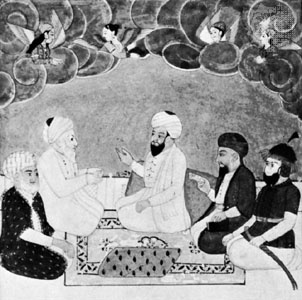Abū Bakr
Muslim caliph
also called al-Ṣiddīq (Arabic: “the Upright”)
born c. 573
died August 23, 634
 Muhammad's closest companion and adviser, who succeeded to the Prophet's political and administrative functions, thereby initiating the office of the caliphate.
Muhammad's closest companion and adviser, who succeeded to the Prophet's political and administrative functions, thereby initiating the office of the caliphate.Of a minor clan of the ruling merchant tribe of Quraysh at Mecca, Abū Bakr purportedly was the first male convert to Islam (Islāmic world), but this view is doubted by a majority of Muslim historians. Abū Bakr's prominence in the early Muslim community was clearly marked by Muhammad's marriage to his young daughter ʿĀʾishah and again by Muhammad's choosing Abū Bakr as his companion on the journey to Medina (the Hijrah 【Hegira】, 622). In Medina he was Muhammad's chief adviser (622–632) but functioned mainly in conducting the pilgrimage to Mecca in 631 and leading the public prayers in Medina during Muhammad's last illness.
On Muhammad's death (June 8, 632), the Muslims of Medina resolved the crisis of succession by accepting Abū Bakr as the first khalīfat rasūl Allāh (“deputy 【or successor】 of the Prophet of God,” or caliph). In his rule (632–634), he suppressed the tribal political and religious uprisings known as the riddah (“apostasy”), thereby bringing central Arabia under Muslim control. Then by undertaking direct expansion from Arabia into Iraq and Syria, he began the Muslim conquests.
- rowing
- Rowland, F. Sherwood
- Rowland, Henry Augustus
- Rowland Hill
- Rowlandson, Mary
- Rowlandson, Thomas
- Rowlatt Acts
- Rowley, William
- Rowling, J.K.
- Rowling, Sir Wallace Edward
- Rowntree, B Seebohm
- Rowse, A.L.
- Rowson, Susanna
- Roxana
- Roxas
- Roxas, Manuel
- Roxburghshire
- Roxbury
- Roxy Music
- Roy Acuff
- Royal Academy of Arts
- Royal Academy of Dramatic Art
- Royal Air Force Museum
- Royal Air Force, The
- Royal Albert Hall